
A.I. Music and Identity Shaping: Soulless Computer Music Versus Soulful Human Music
The concept of Artificial Intelligence (A.I.) Generated music is rather new. With the rise of OpenAI’s ChatGPT, Google’s Bard, and VoiceAI, artificial intelligence has rapidly become a massive topic within public discourse. The term has been gaining mainstream news coverage and has already been impacting various parts of our society such as education. Recently, another industry caught the A.I. virus, namely the music industry. From Kanye West singing “Viva La Vida” by Coldplay to Michael Jackson singing “I Feel It Coming” by The Weeknd to a popular fully AI-generated song called “Heart On My Sleeve” by Drake and The Weeknd, people are massively utilizing AI programs – especially audio deep fake - to develop music. This development within AI and the music industry has been raising questions about musical ownership, ethical/legal implications, and whether music like this could ever become on par with traditional music creation, or even replace it in the future.
However, there is an aspect of A.I.-generated music that is severely overlooked in this discussion: identity shaping. After all, one of the primary reasons why certain artists rose to fame, is their relatability and capacity to portray emotions in their music and lyrics, allowing us to identify with the set artist. With this article, I want to analyze users’ interactions with AI music, especially the previously mentioned “Heart On My Sleeve”, to find out whether a soulless computer can simulate soulful music. Throughout this paper, I will utilize the concept of the "soul" inside music at various times. To properly understand this, I deem it to properly define and clarify this concept. In my eyes, the "soul" inside music refers to the emotional expression that the musician evokes in the song and the emotional interpretations by the listener. It refers to the connection that develops between listeners and musicians through music. The "soul" of music represents its power to touch hearts, move individuals, and create a sense of shared understanding and empathy among listeners. With this paper, I want to discuss, analyze and predict what can be expected in the future: will all music on the charts be created utilizing artificial intelligence or will this phenomenon die down just as fast as it was born? Can A.I. develop that same shared understanding and empathy among listeners as humans?
Verse 1: "I Came in with My Ex Like Selena To Flex, Aye/Bumping Justin Bieber The Fever ain’t left, Aye.” - A.I. Drake's music
"I Came in with My Ex Like Selena To Flex, Aye/Bumping Justin Bieber The Fever ain’t left, Aye.” These are the first words we hear in the voice of what seems to be Canadian musician Drake's rap on a song called "Heart On My Sleeve". The song got uploaded to streaming services like Spotify and Apple Music on April 4th, 2023 by TikTok user GhostWriter977. The controversial song features A.I.-generated vocals of Canadian musicians Drake and The Weeknd and although we definitely hear vocals of the duo, they played no role in the creation of the song. "The lyrics, instrumental beat, vocals and melody were created by A.I." (Coscarelli, 2023). He used A.I. to create realistic vocal clips - also known as audio deep fake - to create vocals that sounded like the famous pop stars. The first few days were quiet with the song not gaining any notoriety. This gradually changed on April 15th, 2023, after GhostWriter977 uploaded a one-minute fragment of the song on TikTok, which quickly attained over 8 million views.
Just a mere two days after the snippet gained notoriety, on April 17, “Universal Music Group filed a takedown notice of the song across the various streaming platforms.” (Sato & Lawler, 2023). An investigation by The Verge found that UMG had been able to copyright claim the song through Metro Boomin’s famous producer tag – “If Young Metro don’t trust you, I’m gon’ shoot you”- featured at the beginning of the song. “Universal Music Group claimed it was an unauthorized sample and successfully got the song pulled.” (Sato, 2023). In this case, UMG was able to successfully take down the song, but just barely. The problem is that AI-generated tracks aren’t “copying anything concretely protected by the law" as "an artist’s voice, style, or flow is not protected by copyright." (Sato, 2023). However, the battle isn't over. Re-uploads of the song without the producer tag have been circulating over the Internet and GhostWriter977 himself actively re-uploads the song to his YouTube channel, claiming that "this is just the beginning."
Verse 2: Shaping Identity through Musical Expression and Artificial Intelligence
As the topic of A.I.-generated music is a fairly recent one, the research on it is not extensive. Articles primarily discuss A.I music’s implications on copyright laws and the feelings listeners have when they listen to A.I-Generated music. For example, in the research of The Learning Network (2023), many students argued that A.I.-generated music would not have the emotional pull of music made by humans and that A.I. could never replace the connection between musicians and their fans. But, they saw A.I. as having the potential to change how the music industry operated and stated that they would give A.I-Music a chance. While this takes into consideration the reactions towards A.I.-generated music, it does not discuss an important quality for any musician. Namely, the social identity that gets created by both the listener and the musician through the creation of music. Is it the same with A.I.-generated music? The lack of information on this side of the coin makes me want to narrow down the scope to this aspect.
Defined as “a person’s sense of who they are based on their group membership” (McLeod, 2023), identity can be shaped through music. As Lidskog (2016:25) states, music is a constitutive part of culture and hence important for individual and social identity formation. Music can serve as a space and practice that “binds group members together so that they understand themselves as belonging to each other and maybe even having a specific task or mission to accomplish” (Lidskog, 2016:25). Such missions might be empowering marginalized communities - something which hip-hop has been born out of - or social activism. Through "musicking" - a verb that encompasses all musical activity - "emotional, social, and cognitive ties can develop, implying the construction and enactment of a social (individual) identity”. (Shelemay 2006). Musicking references to "the relationships that are established between the participants and performers by the performance." (Small, 2006:1). These relationships "unite the living world" according to Small. Music also has the ability to "evoke powerful emotional responses" (Heshmat, 2019) with both Drake and The Weeknd's popularity being contributed to the fact that they “love to get emotional and introspective on their tracks, which resonates with their audience.” (Schmidt, 2020).
Taking these sources into account, it seems as if they collectively indicate that a sense of human touch or connection in and surrounding music creation is crucial in order to shape a social identity through music. Can A.I. shape the same relationship with its audience as a real, human performer can? And can the same kind of identity – shaped by musicking soulful music - be simulated by a soulless computer?
And can the same kind of identity – shaped by musicking soulful music - be simulated by a soulless computer?
In the following section, I will try to answer this question by utilizing discourse analysis. I am going to analyze the reactions to “Heart On My Sleeve” by utilizing comments from the subreddits R/Drizzy, R/TheWeeknd, R/AI_Music, socialblade.com, and other social media platforms. The data will all be from the timespan of the past two months (April 2023 to May 2023), since the first fragment went viral. My analysis of this data will touch upon the most prominent themes that are brought up by users when talking about the popular deep fake song.
Verse 3: “Best Drake Song In A Decade.”
Since its release, Heart On My Sleeve’s media and news coverage have only exhilarated the massive popularity of the deep fake song. If we take a look at Ghostwriter977 SocialBlade account – which is a Youtube analytics website – we can see that he’s gathered up to almost one million video views in the last 30 days on Youtube alone, with thousands of people interacting with the song on a daily basis. According to Socialblade, Ghostwriter977 has approximately earned around 3.5 K (Dollars) in May 2023 alone from the A.I.-song.

Figure 1
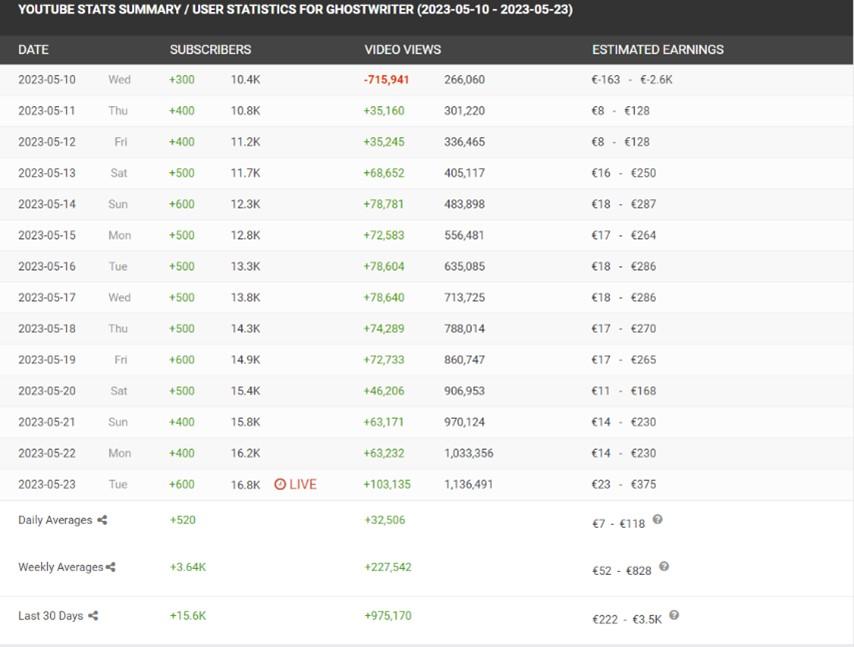
Figure 2
The majority of user comments found across the beforementioned platforms and sources highlight an intriguing trend: the comments are captivated by how realistic and “fire” the song sounds, despite being made using A.I., and often express their surprise at not being able to tell the difference. Fire is slang for something that is great or amazing. One comment focuses on the opening lyrics: “I Came In with My Ex Like Selena To Flex, Aye/Bumping Justin Bieber/The Fever ain’t left, Aye” and thinks that it is “such a drake bar”. This observation sheds light on the remarkable ability of A.I.-generated music to produce lyrics that capture the essence and lyrical characteristic traits of specific artists – in this case, Drake – with a high degree of accuracy and realism. Figures 3, 4, 5, 6, and 7 reflect the positive reception of the deep fake song within the music community - with one going as far as saying that it is the “best Drake song in a decade". Most of these comments - no matter how positive they are - still focus on the A.I. nature of the song.

Figure 3
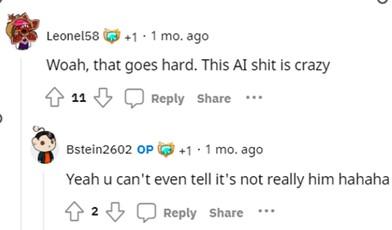
Figure 4

Figure 5

Figure 6

Figure 7
Verse 4: “You’ve Changed The Game”
As stated before, the majority of comments highlight how the song sounds "fire" and focuses on the A.I. nature characteristics of the song. Among the various comments discussing A.I.-generated music, a significant number were more critical and they centered around the implications that this music might have on the music industry and copyright laws. These comments reflect a sense of anticipation, speculation, and primarily fear and concern regarding the potential impact of AI on “the game”, slang for the music industry. Figure 10 in particular captures this concern with its bold claim that “Heart On My Sleeve” marks “the beginning of the end” for the music industry. This claim encapsulates the belief that the emergence of A.I. could reshape the modern music industry. The public nature of both A.I. and music combined with the inability to control or shut them down, may lead to a significant shift in power dynamics, traditional structures, and the way we perceive and experience artists within the music industry. By contemplating the implications of A.I.-generated music on “the game”, these comments provide a critical glimpse into the broader discussions surrounding the usage of A.I. in the music industry.

Figure 8

Figure 9

Figure 10
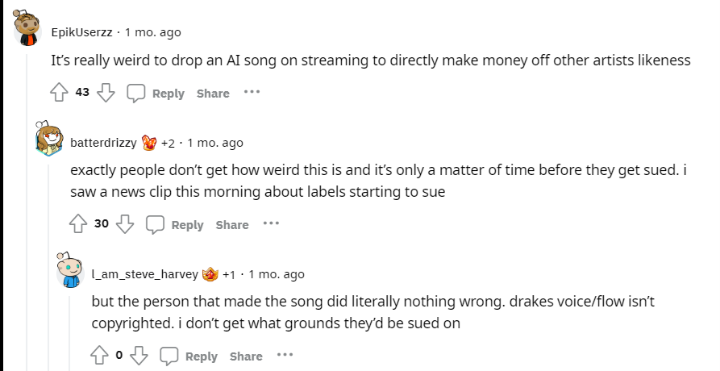
Figure 11
Verse 5: “AI is good, but it will never capture the human element of songs.”
Another frequent observation that I saw get made across the various subreddits revolves around the lack of “human touch” present in the songs. While the music may utilize vocals from Drake and The Weeknd, certain listeners argued that the song fails to capture the effort and passion these artists put into their art. A.I. cannot capture the human connection that makes art personal and "human", something we usually hear in Drake’s and The Weeknd’s work. “We love music and artists because of the effort they put into it” reads one of the comments responding to a comment that reads “What does Drake and Weeknd have to do with this song. It’s not their song” highlighting that the song does not involve any real artistic involvement of both Drake and The Weeknd. While another comment reads “AI is good, but it will never capture the human element of songs.” As mentioned before, the act of musicking between the participant and performer is essentially crucial for the construction of a social (individual) identity through music. The lack of human touch and connection raises doubt about the computer’s ability to replicate the personal relationship that is created through musicking. This highlights the essential role human touch and connection play in establishing a relationship between the participants and performer and thus (individual) social identity. This essential role is reflected in comments such as "we love music and artists because of the effort they put into it", "what does Drake and The Weeknd have to do with this song. It's not their song" and "It's crazy how much a real human touch makes a difference in art."
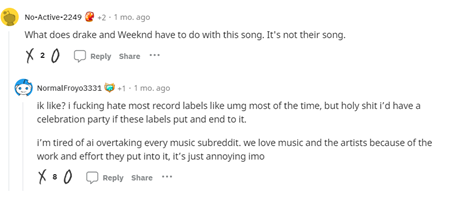
Figure 12

Figure 13
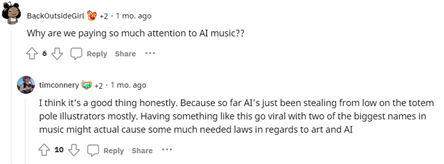
Figure 14

Figure 15
Chorus: Take-Home Message!
User interaction analyzed through discourse analysis can be categorized as both positive and negative. People on the R/Drizzy subreddit were less critical of the A.I. nature of the song and referred to it as "fire" or "hard", while people on the R/TheWeeknd and R/AI_Music were more critical and brought up problematic characteristics surrounding the A.I. music phenomenon. Most comments indicate that the lack of human touch and connection hurts the A.I. song as it doesn't allow the creation of personal relationships between the listener and performer that is created through musicking, which was vital for the creation of social (individual) identities. Considering that most comments regarding the song mention the A.I. nature of the song and not necessarily quality interplay about the song itself, I estimate that A.I. music will only be known for its main characteristic: artificial intelligence. It appears to me that it will not be taken as "real" music, failing to establish a relationship between listener and performer through musicking, and thus failing to create social (individual) identities. Taking this information into account, the question "can the same kind of identity - shaped by "musicking" soulful music - be simulated by a soulless artificial computer" can be answered negatively, leading to me the conclusion that they cannot.
The morality and legality debate of A.I. generated music which “Heart On My Sleeve” has opened up, might lead to stricter laws that protect the artist’s art more strictly, ultimately fueling the decrease in popularity and development of and surrounding the phenomenon. It might be feasible to say that GhostWriters977 first viral hit might also be his last, ultimately shooting himself in the foot and falling from grace faster than he came.
References
Ashton, K. (2014, 29 May). First MA essay: On Music and Identity. Blogspot.
Frith, S. (Ed.) (2011). Music and identity. SAGE Publications Ltd.
Heshmat, S.,(2020, 6 november). Music, Emotion, and Well-Being. Psychology Today.
Kanye Bot. (2023, 18 maart). Kanye West - Viva La Vida (AI Cover) [Video]. YouTube.
Lidskog, R. (2016). The role of music in ethnic identity formation in diaspora: a research review. International Social Science Journal, 66(219-220), 23-38.